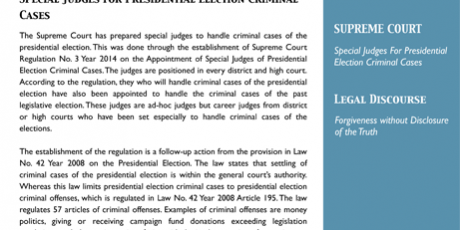Legal Discourse
Forgiveness without Disclosure of the Truth
Fadli Zon, Vice Chairman of the Gerindra Party in one occasion stated that the issue of human rights violations is often used as a political weapon against Prabowo Subianto, Chairman of the Gerindra Party. Therefore, still according to Fadli Zon, past cases of human rights violations are insignificant and out-of-date. This statement was not without cause. Prabowo Subianto, the Chief of Patron of the Gerindra Party is running for President in this year’s election, has reaped much rejection by many due to his alleged human rights violations in the form of a series of kidnappings of 1998 activists. The National Election Commission decision to pass Prabowo Subianto as a candidate is not immune to such question.
Indeed, there were was still no agenda to set-up a human rights ad-hoc court in order to prosecute the case, so any responsibilities and involvement for the actors are still vague. However, the decision from the Honorary Council of Officers (Dewan Kehormatan Perwira/DKP) states that Prabowo Subianto has been found guilty and has been dismissed from position in the Indonesian National Army. The next step follow should be the establishment of a human rights court by the Government.
Fadli Zon has delivered a serious statement. If the past cases of human rights violations are considered insignificant, then we have openly forgiveforgiven the perpretatorsperpetrators of those cases without having the truth being said. To forgive is different with forgetting what has happened in the past, especially regarding human rights issues. Time has been providing some sort of impunity towards the perpetrators. It’s time to place cases of human rights violations in the framework of legal enforcement instead of political interests. There are two conditions that attach impunity to human rights violators; (i) the absence or inability of the legal mechanism towards investigations of human rights violations, and (ii) the existing legal mechanismse haveas non- technical conditions that makes them unable to function well.
A set of regulations such as Law No. 39 Year 1999 on Human Rights and Law No. 26 Year 2001 on the Human Rights Court should suffice to investigate human rights violations. This means that the incompletion of human rights violation cases is more directed to the second condition; lack of political will. This factor has surfaced since the early stages of the investigation by the Human Rights National Commission (Komisi Nasional Hak Asasi Manusia/KOMNAS HAM), which was not considered a pro justicia investigation. The consequences is the absence of legal mechanisms and not being forwarded to the investigation and prosecution stage by the Attorney General. The stagnant investigation process of the 1998 case was caused by the alternating of case files between the two institutions. Even though the KOMNAS HAM investigation is in fact pro justicia, the key is still held by the Attorney General who, structurally, is below the President.
Similar to establishing the Human Rights ad hoc court that needs a Presidential Decree. Should must be noted that for the 1998 case, the House of Representatives has already issued a recommendation for the President to establish an Adhoc Human Rights Court, search for the thirteen missing activists, provide rehabilitation and compensation to families of victims, and ratify the convention on anti enforced disappearances. To this day, none have been enacted by the current President Susilo Bambang Yudhoyono . This condition shows that political interests are still dominant in the completion of human rights matters in Indonesia. (MSG)
Supreme Court
Special Judges for Presidential Election Criminal Cases
The Supreme Court has prepared special judges to handle criminal cases of the presidential election. This was done through the establishment of Supreme Court Regulation No. 3 Year 2014 on the Appointment of Special Judges of Presidential Election Criminal Cases. The judges are positioned in every district and high court. According to the regulation, they who will handle criminal cases of the presidential election have also been appointed to handle the criminal cases of the past legislative election. These judges are ad-hoc judges but career judges from district or high courts who have been set especially to handle criminal cases of the elections.
The establishment of the regulation is a follow-up action from the provision in Law No. 42 Year 2008 on the Presidential Election. The law states that settling of criminal cases of the presidential election is within the general court’s authority. Whereas this law limits presidential election criminal cases to presidential election criminal offenses, which is regulated in Law No. 42 Year 2008 Article 195. The law regulates 57 articles of criminal offenses. Examples of criminal offenses are money politics, giving or receiving campaign fund donations exceeding legislation regulations, and obstructing or interfering with the implementation of campaigns.
The appointing of special judges to hear criminal cases of the presidential election is a step in the right direction to expedite the settling process. However, unfortunately, this regulation does not set provisions on the qualifications of the judges. This is needed in order for the judges handling the cases to have competence towards both general and technical regulations in the Indonesian general elections. Such condition can only be obtained by regulating an organized specialized training for the appointed judges. The court’s role is crucial in maintaining the smooth implementation and quality of the election results. (MNS)

